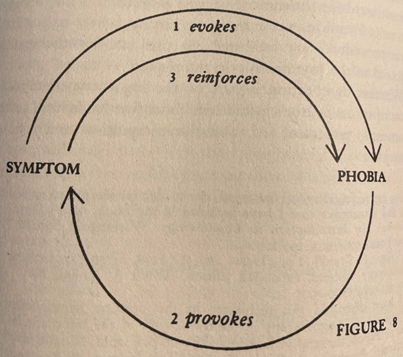Quick – don’t think of an elephant! Were you successful? If you’re like most of us, probably not. Viktor Frankl, the Austrian Psychiatrist and Holocaust survivor, noted back in 1939 that when we dedicate our mind solely to keeping something unconscious from happening, we don’t often prevail. As a matter of fact, doing so often increases the chances of this undesired outcome.
 Thinking of an elephant is rather innocuous, but what if our fear is of erectile dysfunction, or stuttering through a speech? A failure in this case can actually affect our romantic or professional lives and can increase our fear of sex or work presentations moving forwards! Frankl illustrates this feedback loop in the following graphic, taken from his 1988 book “The Will to Meaning: Foundations and Applications of Logotherapy”: (Frankl, 1988).
Thinking of an elephant is rather innocuous, but what if our fear is of erectile dysfunction, or stuttering through a speech? A failure in this case can actually affect our romantic or professional lives and can increase our fear of sex or work presentations moving forwards! Frankl illustrates this feedback loop in the following graphic, taken from his 1988 book “The Will to Meaning: Foundations and Applications of Logotherapy”: (Frankl, 1988).
In an attempt to interrupt this loop, Frankl (1988) devised Paradoxical Intention, which he describes as a technique by which “the patient is encouraged to do, or wish to happen, the very things he fears.” While this certainly seems absurd on the surface, there is a method to Frankl’s madness. As we give ourselves permission for a certain outcome to occur, we take the wind out of “the sails of anticipatory anxiety.” As the existence of anxiety actually increases the chances of the undesired outcome occurring, reducing this anxiety thereby reduces these chances.
So, is this technique effective? Author Stephen Costello (2019) in his book “Applied Logotherapy,” cites a success rate of 77.8%. He also provides a number of examples from Frankl’s work, including a medical student who found herself trembling whenever she interacted with her instructor or patients at her clinical site. Dr. Frankl told her to tell herself, “Here comes the instructor. I will show him what a good trembler I am.” Unfortunately (or fortunately), “when she deliberately tried to tremble, she couldn’t do it.”
Is this humorous? Yes! But you can’t argue with results. If you find yourself hoping against hope that you’ll be able to avoid something that occurs for you unconsciously, why not give Paradoxical Intention a try? However, if you’re skeptical, you’re in good company. According to Frankl (1988), “patients often set out to use paradoxical intention with [the] strong conviction that it simply cannot work, and yet they finally succeed. In other words, they succeed not because of but rather in spite of [the] suggestion.”
References:
Costello, J. S. (2019). Applied Logotherapy: Viktor Franklas Philosophical Psychology. Cambridge Scholars Publishing.
Frankl, V. E. (1988). The Will to Meaning: Foundations and Applications of Logotherapy. Plume.
